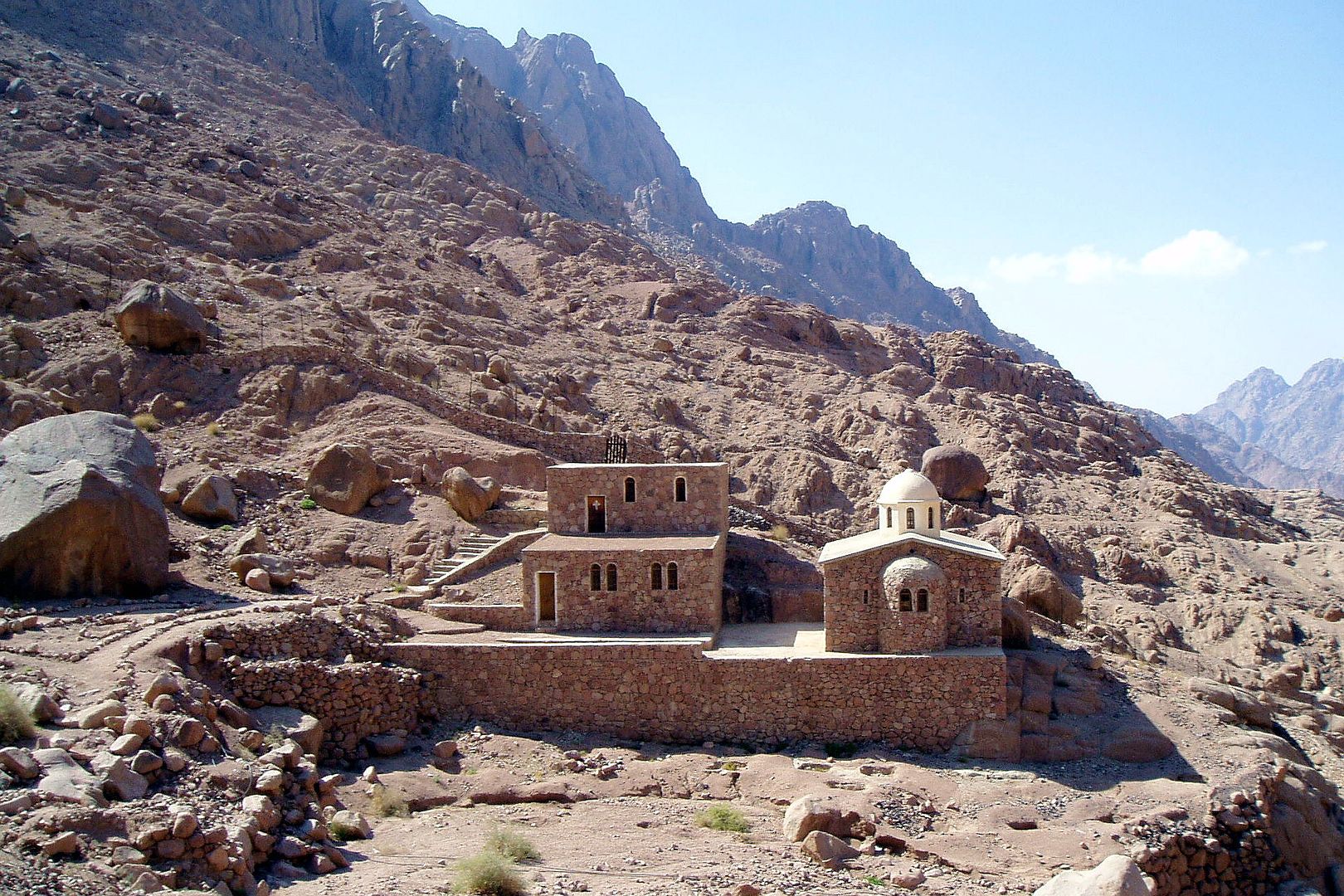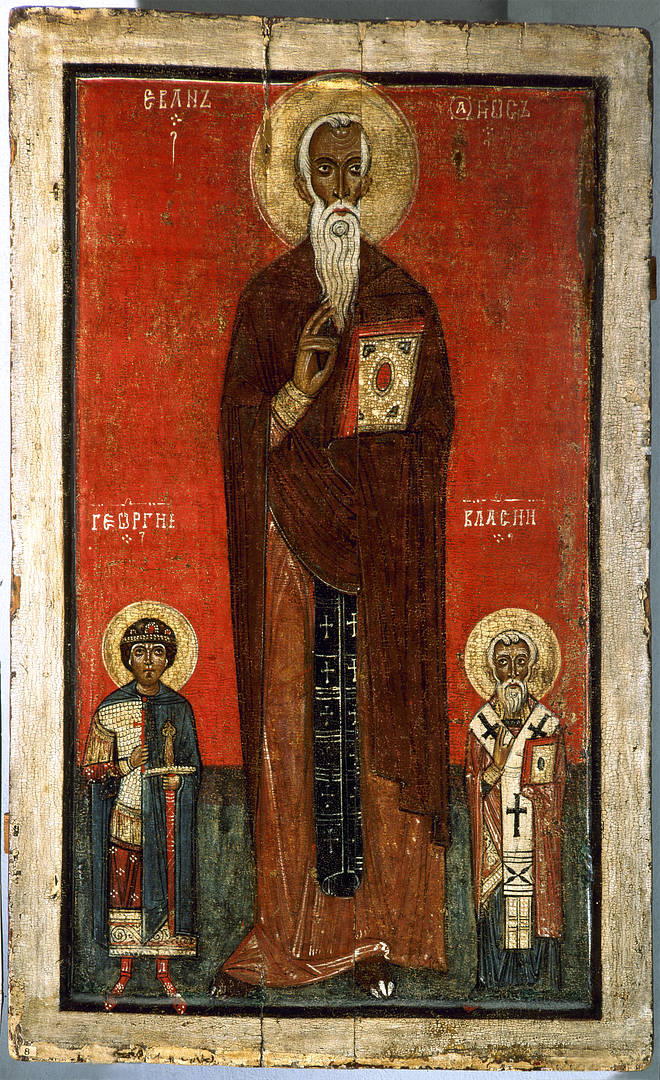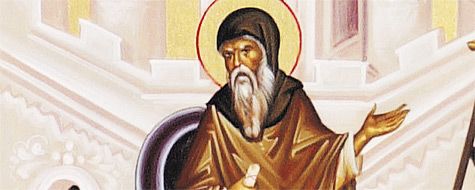Today, March 30, we celebrate the feast of Saint John Climacus (also known as Saint John of the Ladder and John Scholasticus, 525-605), Abbot, and author of the “The Ladder of Paradise.” In this text, also translated as “The Climax of Paradise” (from which this holy man draws his referential name, Climacus), Saint John chronicles the 30 steps to Christian perfection—one for every year of Christ’s life until his baptism in the River Jordan by Saint John the Baptist.
Little is known about the early life of John. As a young man, he became a disciple of Saint Gregory Nazianzen, who referred to him as the “Scholastic” due to his great aptitude for learning and holiness. Despite great academic promise, John “retired” from academics at the young age of 16, and sequestered himself at a monastery on Mount Sinai, where he placed himself under the direction of a holy monk named Martyrius. On travels with the monk, John was predicted by various holy figures to be the future Abbot of Mount Sinai, a prediction which eventually came true.
As a novice, John was more fervent than any other, concentrating his efforts on self-mastery and the pursuit of Christian perfection. Upon the death of Martyrius, his mentor and director, John withdrew into a deeper solitude, studying the lives and writings of the saints, and spending his days in deep contemplation of the Lord. In this manner, he remained from the ages of 35 to 75, occasionally making trips into the Egyptian desert for instruction and inspiration. His holiness and wisdom became well known, and many visited seeking advice, counsel, and consolation in times of sorrow.
 |
| Chapel of Saint John Climacus, Mount Sinai |
Prior to his death, John was encouraged to write a list of rules which had guided his life. This he had already begun, in the form of the book, “The Ladder of Perfection.” In this book, he details the thirty degrees of advancement in the pursuit of Christian perfection. The 30 steps include:
1. On renunciation of the world
2. On detachment
3. On exile or pilgrimage; concerning dreams that beginners have
4. On blessed and ever-memorable obedience (in addition to episodes involving many individuals)
5. On painstaking and true repentance which constitutes the life of the holy convicts; and about the Prison
6. On remembrance of death
7. On joy-making mourning
8. On freedom from anger and on meekness
9. On remembrance of wrongs
10. On slander or calumny
11. On talkativeness and silence
12. On lying
13. On despondency
14. On that clamorous mistress, the stomach
15. On incorruptible purity and chastity, to which the corruptible attain by toil and sweat
16. On love of money, or avarice
17. On non-possessiveness (that hastens one Heavenwards)
18. On insensibility, that is, deadening of the soul and the death of the mind before the death of the body
19. On sleep, prayer, and psalmody with the brotherhood
20. On bodily vigil and how to use it to attain spiritual vigil, and how to practice it
21. On unmanly and puerile cowardice
22. On the many forms of vainglory
23. On mad pride and (in the same Step) on unclean blasphemous thoughts; concerning unmentionable blasphemous thoughts
24. On meekness, simplicity, and guilelessness which come not from nature but from conscious effort, and about guile
25. On the destroyer of the passions, most sublime humility, which is rooted in spiritual perception
26. On discernment of thoughts, passions and virtues; on expert discernment; brief summary of all aforementioned
27. On holy stillness of body and soul; different aspects of stillness and how to distinguish them
28. On holy and blessed prayer, the mother of virtues, and on the attitude of mind and body in prayer
29. Concerning Heaven on earth, or Godlike dispassion and perfection, and the resurrection of the soul before the general resurrection
30. Concerning the linking together of the supreme trinity among the virtues; a brief exhortation summarizing all that has said at length in this book
Saint John foretold the hour of his death, and went to it peacefully. He died in the monastery at Mount Sinai. His life and writings remain to inspire us as we continue our Lenten journey toward our own self-mastery.
Selected Quotations of Saint John Climacus:
“Fire and water do not mix, neither can you mix judgment of others with the desire to repent. If a man commits a sin before you at the very moment of his death, pass no judgment, because the judgment of God is hidden from men. It has happened that men have sinned greatly in the open but have done greater deeds in secret, so that those who would disparage them have been fooled, with smoke instead of sunlight in their eyes.”
"Nothing equals or excels God's mercies. Therefore, he who despairs is committing suicide. A sign of true repentance is the acknowledgment that we deserve all the afflictions, visible and invisible, that come upon us, and ever greater ones. Moses, after seeing God in the bush, returned again to Egypt, that is, to darkness and to the brick-making of Pharaoh, who was symbolical of the spiritual Pharaoh. But he went back again to the bush, and not only to the bush, but also up the mountain. Whoever has known divine vision will never despair of himself. Job became a beggar, but he became twice as rich again."
"Repentance is the renewal of baptism. Repentance is a contract with God for a second life. A penitent is a buyer of humility. Repentance is constant distrust of bodily comfort. Repentance is self-condemning reflection, and carefree self-care. Repentance is the daughter of hope and the renunciation of despair. A penitent is an undisgraced convict. Repentance is reconciliation with the Lord by the practice of good deeds contrary to the sins. Repentance is purification of conscience. Repentance is the voluntary endurance of all afflictions. A penitent is the inflicter of his own punishments. Repentance is a mighty persecution of the stomach, and a striking of the soul into vigorous awareness."
"Let us charge into the good fight with joy and love without being afraid of our enemies. Though unseen themselves, they can look at the face of our soul, and if they see it altered by fear, they take up arms against us all the more fiercely. For the cunning creatures have observed that we are scared. So let us take up arms against them courageously. No one will fight with a resolute fighter."
"He who really keeps account of his actions considers as lost every day in which he does not mourn, whatever good he may have done in it."
"I consider those fallen mourners more blessed than those who have not fallen and are not mourning over themselves; because as a result of their fall, they have risen by a sure resurrection."
"But Adam did not wish to say, "I sinned," but said rather the contrary of this and placed the blame for the transgression upon God Who created everything "very good," saying to Him, "The woman whom Thou gavest to be with me, she gave me of the tree and I ate." And after him she also placed the blame upon the serpent, and they did not wish at all to repent and, falling down before the Lord God, beg forgiveness of Him. For this, God banished them from Paradise, as from a royal palace, to live in this world as exiles. At that time also He decreed that a flaming sword should be turned and should guard the entrance into Paradise. And God did not curse Paradise, since it was the image of the future unending life of the eternal Kingdom of Heaven. If it were not for this reason, it would have been fitting to curse it most of all, since within it was performed the transgression of Adam. But God did not do this, but cursed only the whole rest of the earth, which also was corrupt and brought forth everything by itself; and this was in order that Adam might not have any longer a life free from exhausting labors and sweat..."
“Exile means that we leave forever everything in our own country that prevents us from reaching the goal of piety. Exile means modest manners, wisdom which remains unknown, prudence not recognized as such by most, a hidden life, an invisible intention, unseen meditation, desire for humiliation, longing for hardship, constant determination to love God, abundance of love, renunciation of vainglory, depth of silence.”
“A man who takes pride in natural abilities— I mean cleverness, the ability to learn, skill in reading, good diction, quick grasp, and all such skills as we possess without having to work for them — this man, I say, will never receive the blessings of heaven, since the man who is unfaithful in little is unfaithful and vainglorious in much.”
”And there are men who wear out their bodies to no purpose in the pursuit of total dispassion, heavenly treasures, miracle working, and prophetic ability, and the poor fools do not realize that humility, not hard work, is the mother of such things.”
”The man who seeks a quid pro quo from God builds on uncertainty, whereas the man who considers himself a debtor will receive sudden and unexpected riches.”
“Do not try to be verbose when you pray, lest your mind be distracted in searching for words. One word of the publican propitiated God, and one cry of faith saved the thief. Loquacity in prayer often distracts the mind and leads to fantasy, whereas brevity makes for concentration.”
“A man who has embraced poverty offers up prayer that is pure, while a man who loves possessions prays to material images.”
Heavenly Father, Saint John Climacus not only left his written works as an inspiration, but his life is an example to us as well. We pray that our lives be lived in such holiness that those around us will seek our wisdom and imitate our ways to Thy greater glory. Amen.
Year 2: Day 89of 365
Prayer Intentions: Lives focused on self-mastery and attainment of Christian perfection
Requested Intentions: Freedom from imprisonment (J); Employment and end to depression (H); Successful employment (A); Health for a soon to be delivered baby (T); Financial security (L); Healing of tooth pain (A); Health of expectant mother and child (R); Purification of the souls in Purgatory (A); Guidance in studies (J); Healing and security for a displaced family (C); Healing of high blood pressure; Recovery of brother following surgery (A); For a sister in trouble, that she may make better decisions in the light of Christ (M); Health of expectant mother and child (R); Attainment of funds for surgery (J); Freedom from financial difficulties (E); For employment and college acceptance (E); Recovery and healing of a friend (C); For successful outcome to surgery (C); Healing for brother (M); Successful employment (C); For the victims of the Japanese tsunami/earthquake (J); Healing (E); For a son struggling with depression (B); Successful conception (M); Freedom from social anxiety; confidence in the Lord (J); Improved success in employment and studies (D); Freedom from illness (T); For a wife’s employment (E); Healing of a husband’s knee (M); Freedom from sickness (R); Healing (C); Restoration of marriage (F); Freedom from medical difficulties, employment, successful relationship (D); Healing of a father following stroke (S).













No comments:
Post a Comment
Thanks for leaving a comment. If you wish to submit a prayer request, however, please do so above, using the "Contact" tab.